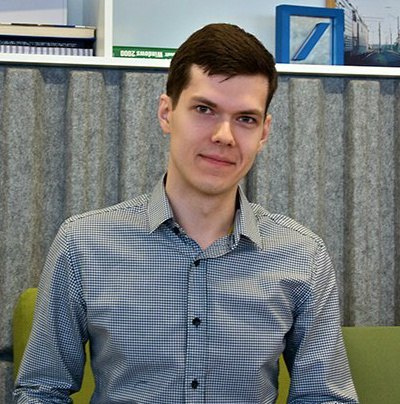Java School: Overview
Habrchane, let's get acquainted! We - Changellenge >> (from the words Change and Challenge) - we are engaged in developing educational practice-oriented education in Russia. To do this, we conduct a series of case-championships under our name Changellenge >> (about 20,000 people participate in them annually), as well as helping large companies organize educational events. Today we would like to talk about the second direction - the training program for young Java programmers at Deutsche Bank School, which, by the way, is currently being recruited.
All information about the School is provided by insiders, namely Yuri Reyman (graduate of Bauman Moscow State Technical University, Faculty of Informatics and Control Systems) and Andrei Merlov (MGTU Stankin graduate, applied mathematics and HSE, mathematical methods of economic analysis), graduates of the first set of Java School in the form of an interview.


Briefly about the school:
Java School was created in order to train talented candidates in the Java language almost from scratch, and then grow them within Deutsche Bank's Development Center as professionals.
Every six months, 15–20 students are enrolled in school. It is necessary to study at school all five days a week; therefore, it is most suitable for either recent graduates or senior students. During training, each student receives a salary in the amount of 100 thousand rubles. The best students at the end of the School are invited to work at the Deutsche Bank Development Center.
')
Process:
What does an average day in Java School look like?
Selection:
How was the selection to the school, what was the most difficult?

Stages of education and teaching:
The first stage of training is the basics of Java programming. How long did this stage last and what happened next?
Direct speech:
There are some atypical thoughts about sabzh that are not found in the previously existing interviews.
What projects have you been assigned to at the end of the Java School?
Uses for:
In addition to the impressions of the students with whom you have already met, and information about what is happening in the School, I would like to share with you useful content. Aleksey Ragozin, one of the school’s teachers, an employee of Deutsche Bank, kindly shared his lecture materials on garbage collection in Java with the community. Find them here
The second set in the Java School:
Till October 10, we are accepting applications for admission to the Java School. Read more on the site.
Feedback:
We will welcome suggestions and suggestions about the article. But even more interesting is that we are also ready to give you information about the Java School firsthand. Deutsche Bank employees will answer your questions in the comments.
All information about the School is provided by insiders, namely Yuri Reyman (graduate of Bauman Moscow State Technical University, Faculty of Informatics and Control Systems) and Andrei Merlov (MGTU Stankin graduate, applied mathematics and HSE, mathematical methods of economic analysis), graduates of the first set of Java School in the form of an interview.


Briefly about the school:
Java School was created in order to train talented candidates in the Java language almost from scratch, and then grow them within Deutsche Bank's Development Center as professionals.
Every six months, 15–20 students are enrolled in school. It is necessary to study at school all five days a week; therefore, it is most suitable for either recent graduates or senior students. During training, each student receives a salary in the amount of 100 thousand rubles. The best students at the end of the School are invited to work at the Deutsche Bank Development Center.
')
Process:
What does an average day in Java School look like?
In different ways, depending on the stage of training. At the first stage, we spent the day at Deutsche Bank, the audience was set up there, where we had our computers, a projector, etc. At the second stage, when we were doing laboratory work, we mostly worked from home and came to talk with supervisors and discuss the results. Those who are more comfortable working in the office, could spend the whole day in the office. And at the third stage there was almost full-time work, but at the same time we were already in a more unifying environment - on the day we had several consultations or seminars, that is, every day we got acquainted with 3-4 new people.Did you manage to combine studying at a Java School with studying at a university?
On May 3, I graduated from the Java School, and on June 3, I defended a diploma. It was Saturday and Sunday, when you could write a diploma. The load was distributed fairly evenly, and it turned out that if we were efficiently approached, all the homework that was given could be done on weekdays evenings and thus free up the weekend for writing the diploma.
Selection:
How was the selection to the school, what was the most difficult?
I believe that communication with a bank employee, as I personally had no difficulty with the programming test and other tasks.Was there something bright, memorable during the selection that you didn’t see at other interviews?
Well, there were quite funny tasks, I mean from the point of view of the logical statement. Here, for example, there are several baskets in front of you; for each one it was necessary to pick up the plates with the correct name of the fruits that are in it. It loosened my brain when I was asked to solve this, but I quickly managed to do it.

Stages of education and teaching:
The first stage of training is the basics of Java programming. How long did this stage last and what happened next?
The first stage was called "Getting to know Java." He was read to us by a teacher from an external company. He specializes in teaching including the Java language, so he had a clear course, everything was built perfectly. It was interesting, there was feedback, retrospective daily - it was very cool. After completing the course, we performed a large laboratory work, for which we were given two weeks. Each had its own supervisor - an employee of the Development Center. Thus, we immediately got acquainted with our future managers. At the end of the two-week laboratory work - it was defended. After that there was another three-week course - already in-depth topics on Java and presentations of projects that are being developed at Deutsche Bank.How was the assignment to the projects after the advanced course?
During training at the Java School, our work was supervised by teachers. They chose those who suit them more professionally. Accordingly, after the Java School you get to their team.What are the features of an in-depth course?
At this time, studied narrower issues. This course was taught by employees of the Deutsche Bank Development Center. I remember several people in particular: Andrei Taranov read, Alexey Ragozin read very well about the garbage collection. Indeed, the topics were interesting, they were very well covered by us, and, as practice has shown for more than three months, this knowledge turned out to be useful.
Direct speech:
There are some atypical thoughts about sabzh that are not found in the previously existing interviews.
What projects have you been assigned to at the end of the Java School?
It is difficult to explain to an outside person ... The project is connected, let's say, with high performance, that is, we are developing a program that processes 50,000 applications per second.As a bauman, can you compare modern academic education and education at the Java School? Suppose how much useful knowledge is found both there and there as a percentage of a hundred?
It is very difficult to compare as a percentage, as I think these things are very different. The PhysTech gave me a fundamental education and brought up the ability to solve non-standard and complex tasks, to choose the right from a large flow of information, and, of course, all the basic knowledge. Java School gave more specific, narrow knowledge, some tools that are used in everyday work. I believe that the one without the other can not exist, one relies on the other, and I am grateful to both possibilities.Nontrivial question ... For the habrasoobshchestva it will be useful to find out what cons have you noticed while studying at the Java School?
There were no cons, but rather some kind of hitches. In the first week, it seems to me, time was not very rational, because the teacher often answered too simple questions, although he could give a link to some sources. Therefore, in the first week, I think we lost some time, but we quickly understood it and caught up in the remaining two weeks.How different is the level of training from different students?
I, in particular, did not know Java at all, but I had experience in developing and, in principle, understanding programming and device of this whole life. It seems to me that, on the whole, the level was not exactly the same - there were lagging guys, and those who were slightly better.Maybe there was something else that could be improved?
I took courses of this kind in C ++ at Mix, and there was a rating system that raised students' enthusiasm. After all, we all want to be among the leaders, striving to do better. And when we see that, yes, we are lagging behind in the ranking, yes, we are already in the very last rows, it is pushing us. And when you just get paid a salary or a scholarship, you don’t really want to strive for something. In the Java School, there was no ranking as such. We were given papers, we were noted, and at the end this rating was seen by the organizers of the Java School. Then the curators exchanged opinions, and on the basis of all this, decisions were made who to take and who not to take.Did you have any memorized phrase or local meme during training?
I remember that one of the teachers always greeted everyone with the phrase: “Good morning!”. It was unchanged. Something funny was constant, we often had fun.
Uses for:
In addition to the impressions of the students with whom you have already met, and information about what is happening in the School, I would like to share with you useful content. Aleksey Ragozin, one of the school’s teachers, an employee of Deutsche Bank, kindly shared his lecture materials on garbage collection in Java with the community. Find them here
The second set in the Java School:
Till October 10, we are accepting applications for admission to the Java School. Read more on the site.
Feedback:
We will welcome suggestions and suggestions about the article. But even more interesting is that we are also ready to give you information about the Java School firsthand. Deutsche Bank employees will answer your questions in the comments.
Source: https://habr.com/ru/post/196664/
All Articles